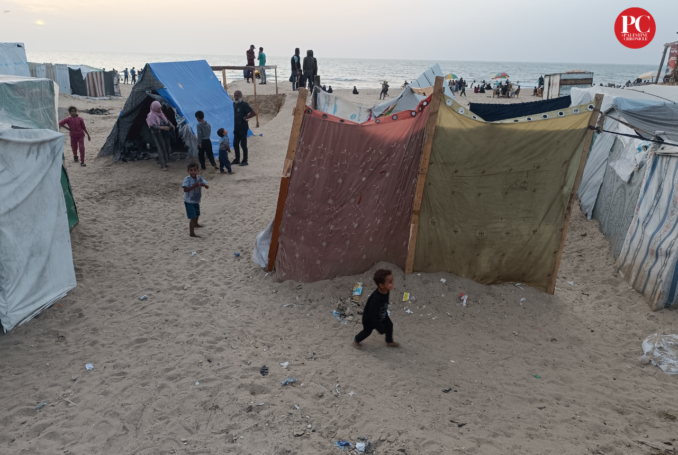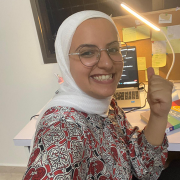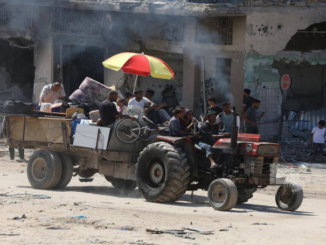
What we have endured during these long months is beyond comprehension. It genuinely feels like a horror movie, from which I emerge as just one of the endless list of victims.
Living in Rafah as a displaced person was a daily struggle.
Our journey of displacement in this southern city of Gaza was marked by the constant fear of yet another evacuation order, along with the ever-present stress and anxiety.
The extreme overcrowding in the city and the soaring prices of all commodities were additional burdens.
My mother, always anticipating the worst, endlessly searched for a tent in case we had to evacuate Rafah. With the help of friends, she succeeded in securing one. The tent allowed us to move to the ‘No Tears’ camp in Al-Shabura.
Living in that tent filled me with a deep sense of disappointment and hopelessness about ever returning home.
Screams of Mothers, Cries of Children
In the early hours of May 7, I was jolted awake by the sound of artillery shells being fired indiscriminately, with shrapnel raining down on our displacement tents. The air was soon filled with the screams of mothers and the cries of children.
The image of a child injured by shrapnel with his mother frantically checking on him will never leave my mind.
Two hours into this horror, we packed our belongings and prepared to move to what the Israeli occupation forces deemed a ‘safe area’.
Shortly after, we officially received the distressing news of the mandatory evacuation of Rafah.
My family, like many others, desperately searched for a new shelter and eventually, found a spot in Mawasi, Khan Yunis, designated by the Israeli occupation army as the ‘safe area’.
We reached Khan Yunis safely. The city was unrecognizable with all the destruction, rubble, and heartbreak that had hit it.
I wept at the sight, thinking of all the families who had lost their homes and were now sleeping in the streets. I couldn’t stop thinking about those who had lost their loved ones in this ravaged city.
We settled in Khan Yunis as the eighth month of this genocide loomed, with Gaza standing all alone, resisting.
What we have endured during these long months is beyond comprehension. It genuinely feels like a horror movie, from which I emerge as just one of the endless list of victims.
Imagine for a moment what Gazans have endured during this genocide – displaced from their land, controlled by those who have stolen their homeland, told where to go or not go, while the world watches, paralyzed by fear of the oppressor’s might.
Now imagine losing your home, the place that holds all your memories. Imagine losing a brother, a sister, a mother, or a father. How could you ever cope with such heavy losses and continue living a normal life?
Imagine for a second refusing to leave your home, only for the occupation forces to invade and kill your mother before your eyes, leaving her to bleed to death, as you are ordered to flee to save your life.
These are not imaginary stories. These are real stories that the people of Gaza have experienced since the start of the genocide.
These stories are a reflection of the occupation’s brutality, which will remain forever etched in the collective memory of those who have lived through this genocide.
Hardship and Disease
My life in Khan Yunis was marked with enormous hardship and challenges. I was exhausted.
Yet, we, like many others, developed a daily routine in our new life in a tent. Every morning, we woke around seven, either to the sounds of shelling or the voices of children playing.
Once awake, we started a fire to prepare our tea and breakfast – a task I loathed but had to do every morning since gas for cooking was unavailable.
After spending countless days in the South, I can confidently say that I never enjoyed a cup of tea as much as the one in my home in Gaza City.
After breakfast, came the hard task of fetching water.
With a bucket in hand, we collected salty water for multiple uses: washing, bathing, and cleaning. We carried the bucket a long distance through the city’s destruction. The usually one-hour journey felt endless.
Next, we waited in long queues for filtered water for drinking or cooking. This involved pushing and shoving until our turn came to fill the container.
Once that was done, we lit the fire one more time to prepare lunch, which was our last meal of the day as we skipped dinner for several reasons.
As night fell, darkness set in, accompanied by terrifying sounds.
We dread the night, as it frequently brings intense shelling, death, and destruction of homes, often with their residents still inside.
We also fear the drones that hover over the camps, which always stir cries of fear from children and women.
Moreover, going outside at night is extremely dangerous, as the Israeli occupation forces could shoot at anyone.
Life in the tent does not only bring much hardship but also all kinds of diseases.
Hepatitis is one of those unwelcome visitors. I contracted a moderate case of the condition in June.
When I learned of my diagnosis, I felt hopeless.
At times, I slept for three days straight, unaware of what was happening around me. I had no appetite and survived solely on saline solution and water. Thirteen days of illness left me extremely frail.
Slowly, I regained my strength and took my first steps around the camp. My infection coincided with the day of Arafah, which deprived me of fasting since I was on a special diet.
Summer in a tent was something I dreaded, but it was a reality we had to endure. The unbearable heat of July not only deprived us of sleep but also brought along so many unwelcome visitors like swarms of flies hovering all over the tent.
Each morning, we would hear the sounds of shelling along the border between Rafah and Khan Yunis. This was a sad yet stark reminder that this war has become part of our daily lives.
Contemplating all the scenes of death and destruction that were taking place in Rafah and other cities in Gaza touched me deeply.
After months of this genocide, my only dream is to return to the warmth of my home. I miss the small details that defined my life there – the coziness of my room, the warmth of my bed, and the familiar scent of my hometown.
Feels like Exile
Living in another city in Gaza feels like exile. Neither Khan Yunis nor Rafah made me feel at home. My heart remains in the north, the place loaded with memories that haunt me.
I miss the hectic Sundays packed with lectures, the midday traffic jams at the Saraya intersection, and the rush to avoid being late for an 8 am class.
I yearn for those morning taxi rides filled with patriotic songs, the classic breakfast from Abu Zahir’s in the Old City, and the evening knafeh from Abu Saud.
I remember the slow drives along Rashid Street or relaxing with friends at the port beach after exams, where the results always took us by surprise.
How can I leave all these memories behind me and move on?
It is a question I keep asking myself.

– Noor Abu Mariam is a 20-year-old Business Administration student at the Al-Azhar University in Gaza, specializing in English. As Gazan, she is currently focused on using writing as a powerful tool to share her story with the world, aiming to shed light on the experiences and resilience of her community. She contributed this article to the Palestine Chronicle.







